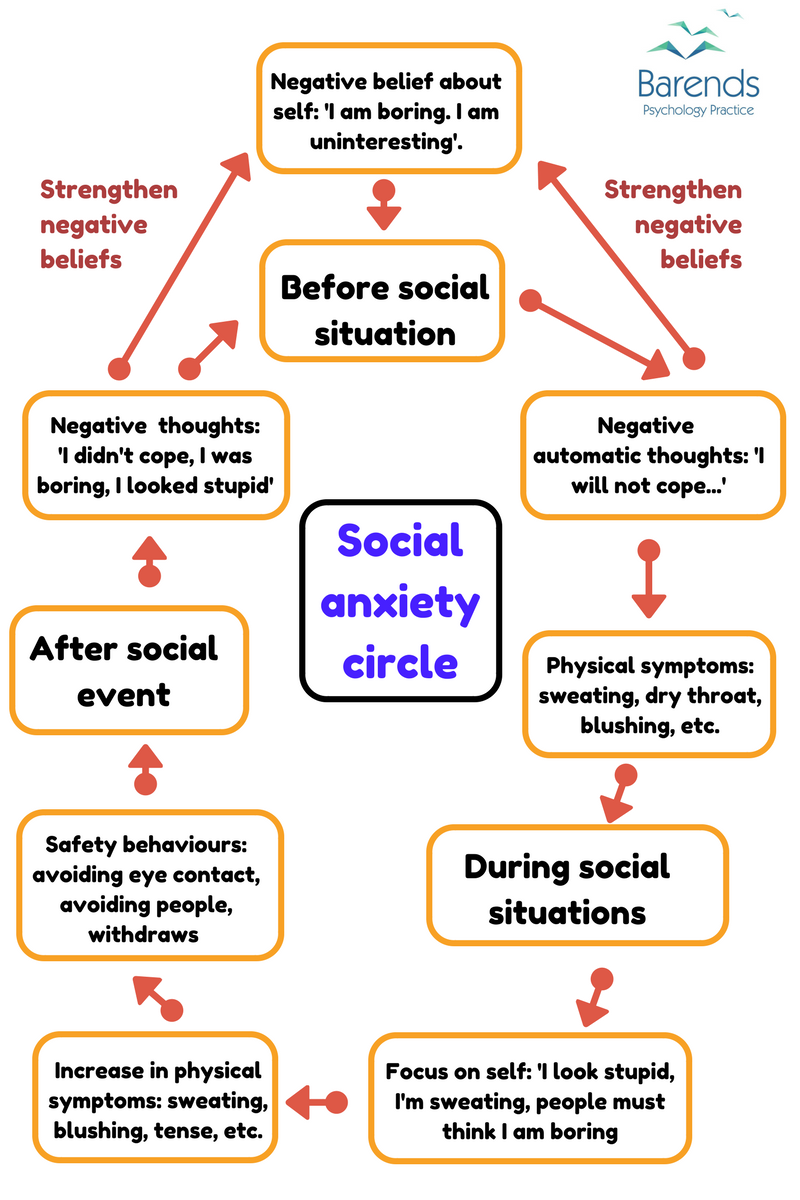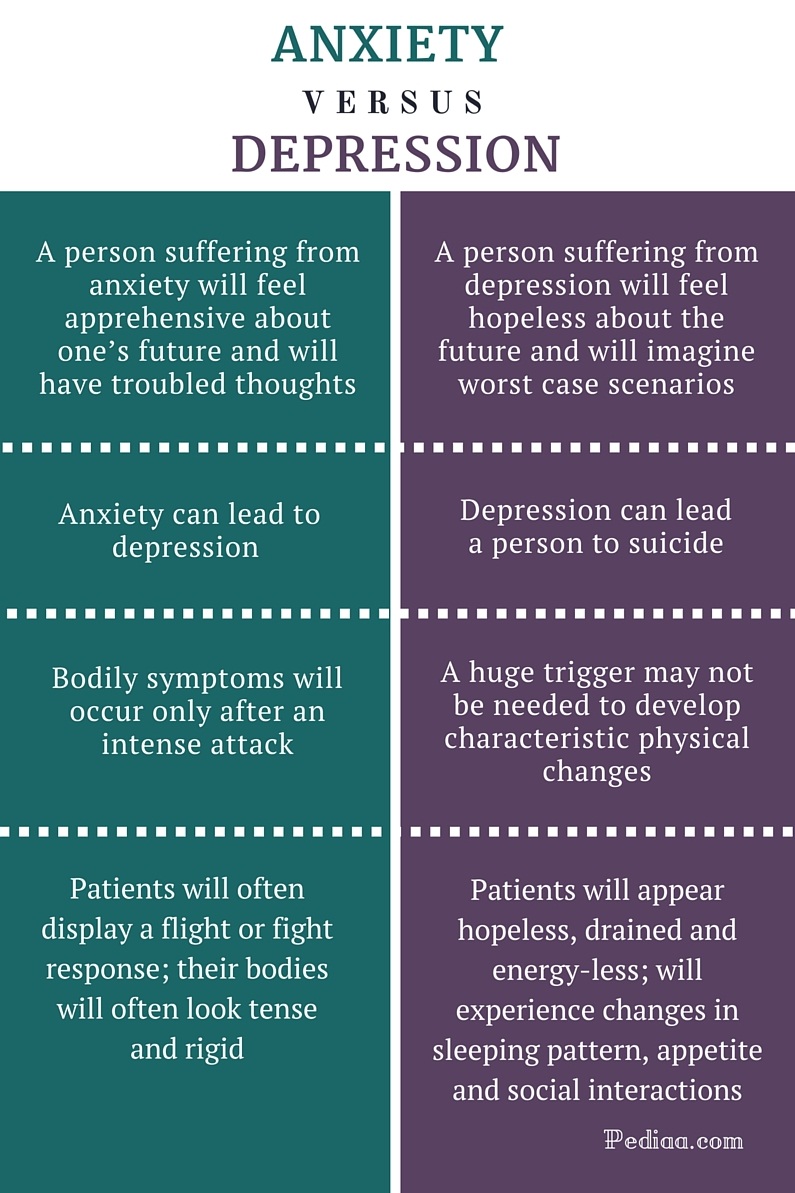Anxiety disorders are a group of related conditions, each having unique symptoms. However, all anxiety disorders have one thing in common: persistent, excessive fear or worry in. How to Overcome Fear, Anxiety and Worry Historians will probably call our era the age of anxiety. Anxiety is the natural result when our hopes are centered in anything short of God and His will for us. The term anxiety disorder refers to specific psychiatric disorders that involve extreme fear or worry, and includes generalized anxiety disorder (GAD), panic disorder and panic attacks, agoraphobia, social anxiety disorder, selective mutism, separation anxiety, and specific phobias. worry a strong feeling of anxiety; his worry over the prospect of being fired; it is not work but worry that kills; he wanted to die and end his troubles trouble. anxiety a vague unpleasant emotion that is experienced in anticipation of some (usually illdefined) misfortune. Generalized anxiety disorder is excessive worry around a number of everyday problems for more than six months. This anxiety is often far greater than expectedfor example, intense anxiety over a. Fear and Worry Emotions such as fear and worry are commonly experienced by children and adolescents as a normal part of maturing. But when these emotions get in the way of your childs daily life and disrupt his or her routine, this could be a sign of an anxiety disorder. Stress and anxiety that occur frequently or seem out of proportion to the stressor may be signs of an anxiety disorder. An estimated 40 million Americans live with some type of anxiety disorder. But for some people, worry is a way of life, writes clinical psychologist Chad LeJeune, Ph. D, in his book, The Worry Trap: How to Free Yourself from Worry Anxiety Using Acceptance. In order to stop worry and anxiety for good, though, you need to give up the belief that your worrying serves a positive purpose. Once you realize that worrying is the problem, not the solution, you can turn off anxious thoughts and regain control of your worried mind. Anxiety is a feeling of unease, such as worry or fear, that can be mild or severe. Everyone has feelings of anxiety at some point in their life for example, you may feel worried and anxious about sitting an exam, or having a medical test or job interview. Such worry must be committed to prayer to God, who can release us from paralyzing fear or anxiety, and free us to deal realistically with the needs and welfare both of others and of ourselves. Collins, Christian Counseling, p. ) Generalized anxiety disorder includes persistent and excessive anxiety and worry about activities or events even ordinary, routine issues. The worry is out of proportion to the actual circumstance, is difficult to control and affects how you feel physically. worry anxiousworry Anxiety comes in many formspanic attacks, anxiety attacks, phobia, and social anxietyand the distinction between a disorder and normal a People with social anxiety tend to worry for. Because we know the hardship anxiety unwellness can cause, we are committed to helping others, with over 30 years of service. Jim Folk, President, anxietycentre. com Worry Test, Self Quiz Generalized anxiety disorder (GAD) is an anxiety disorder that is characterized by multiple andor nonspecific worries. GAD often starts early in life, and people with this diagnosis will often describe being anxious, or being a worrier, for most of their life. experience excessive worry and be anxious about several different events or activities on more days than not for at least six months If there is no specific cause for the anxiety and worry, a. Occasional anxiety is a normal part of life. You might worry about things like health, money, or family problems. But people with generalized anxiety disorder (GAD) feel extremely worried or feel nervous about these and other thingseven when there is little or no reason to worry about them. Excessive worry or ongoing fear or anxiety is harmful when it becomes so irrational that you cant focus on reality or think clearly. People with high anxiety have difficulty shaking their worries. Generalised anxiety disorder (GAD) can affect you both physically and mentally. How severe the symptoms are varies from person to person. Some people have only one or two symptoms, while others have many more. Generalised Anxiety Disorder (GAD) is a general, longlasting worry and anxiety about everyday life, about anything and everything. People with GAD imagine the worst happening (and worry about all the possible worst case scenarios). Anxiety is a natural and usually shortlived reaction to a stressful situation, associated with feelings of worry, nervousness or apprehension. It typically occurs in new, unfamiliar or challenging situations, where the person might not feel up to the task, or where the outcome is uncertain. Anxiety and depression are not the same, but they often occur together. It is not uncommon for people with depression to experience anxiety and people with anxiety to become depressed. Definition of anxiety a feeling of worry, nervousness, or unease about something with an uncertain outcome, strong desire or concern to do something or. Definition of anxiety in English: anxiety. 1 A feeling of worry, nervousness, or unease about something with an uncertain outcome. Mix 528Hz Release Inner Conflict Struggle Anti Anxiety Cleanse Stop Overthinking, Worry Stress YouTube; Relaxing Sleep Music: Deep Sleeping Music, Relaxing Music. Anxiety disorders are different, though. They are a group of mental illnesses, and the distress they cause can keep you from carrying on with your life normally. For people who have one, worry and. Anxiety is the most common mental health condition in Australia. On average, one in four people one in three women and one in ve men will experience anxiety at some stage in their life. 1 In a 12month period, over two million Australians experience anxiety. Due to the unpleasant nature of anxiety, people often worry that experiencing it is harmful. For example they may fear that regularly worrying will make them go mad or that the physical symptoms of anxiety (e. heart racing) are signs of a serious health problem. But anxiety disorders involve more than temporary worry or fear. For a person with an anxiety disorder, the anxiety does not go away and can get worse over time. The symptoms can interfere with daily activities such as job performance, school work, and relationships. Worry is a normal part of life, and can even be helpful in some instances. We often worry about things that are present in our lives, such as finances, work, and family, and this worry has the potential to help us make good decisions in these areas. Generalized Anxiety Disorder (GAD) is characterized by persistent and excessive worry about a number of different things. People with GAD may anticipate disaster and may be overly concerned about money, health, family, work, or other issues. The type of anxiety experienced by people with an anxiety condition is more frequent or persistent, not always connected to an obvious challenge, and impacts. How to Minimize Anxiety and Worry Life is full of many concerns stemming from the absence of certainty and control over our future. While we can never be completely free from worry, the Bible shows us how to minimize worry and anxiety in our lives. Use these selfhelp methods to reduce worry and anxiety. Relaxation has also been shown to reduce depression due to the effect on the neurotransmitters in the brain involved with depression. Please email problems or suggestions. Managing panic, anxiety and worry This free course is aimed at people experiencing problems with anxiety in any form, including general anxiety, phobias, excessive worry, panic attacks, health anxiety, social anxiety and obsessivecompulsive disorder (OCD). Choose the Right Synonym for anxiety. care, concern, solicitude, anxiety, worry mean a troubled or engrossed state of mind or the thing that causes this. care implies oppression of the mind weighed down by responsibility or disquieted by apprehension. a face worn by years of care concern implies a troubled state of mind because of personal interest, relation, or affection. In an anxietyrelated disorder, your fear or worry does not go away and can get worse over time. It can influence your life to the extent that it can interfere with daily. Anxiety, or extreme apprehension and worry, is a normal reaction to stressful situations. But in some cases, it becomes excessive and can cause sufferers to dread everyday situations. care, concern, solicitude, anxiety, worry mean a troubled or engrossed state of mind or the thing that causes this. care implies oppression of the mind weighed down by. Anxiety is a feeling of nervousness, apprehension, fear, or worry. Some fears and worries are justified, such as worry about a loved one or in anticipation of taking a quiz, test, or other examination. Overcoming Anxiety by Helen Kennerley. Self help guide using Cognitive Behavioural Techniques. Stress, worry, and fear, while being a necessary and normal part of everyday life, can have a tremendously detrimental impact on your physical, professional, and emotional health. This is a bundle focused on helping students build selfconfidence, increase positive thinking skills, and reduce anxiety and worrying. The resources are a blend of printable noprep worksheets, activities, lessons, and task cards. Causing anxiety and worry Synonyms, antonyms, and related words and phrases. Thesaurus for Causing anxiety and worry: See more in the Thesaurus and the British English Dictionary Cambridge Dictionary (US) In a Depression and Anxiety Health Alert, she mentions one study that found that people without GAD tended to worry an average of 55 minutes a day, while those with GAD worried for 310 minutes. Anxiety is a feeling of uneasiness and worry, usually generalized and unfocused as an overreaction to a situation that is only subjectively seen as menacing. It is often accompanied by muscular tension, restlessness, fatigue and problems in concentration. Chronic anxiety is a state more undesirable than any other, and we will try almost any maneuver to eliminate it. Modern man is living in anxious anticipation of destruction. Such anxiety can be easily eliminated by selfdestruction. While your level of anxiety doesn't appear to be diagnosable as an anxiety disorder (though you can talk to a doctor to be sure), you do worry too much, and probably cause yourself an undue amount of. What does the Bible say about worry and anxiety? What can we learn from scripture to help us deal with uncertainty in life? Many have sought counsel from the word of God when faced with worry and anxiety, and for good reason. Generalized anxiety disorder is characterized by persistent worry or anxious feelings. People with this disorder worry about a number of concerns, such as health problems or finances, and may have a general sense that something bad is going to happen. Anxiety is a feeling of fear or panic. Feeling generally anxious sometimes is normal. Most people worry about something money or exams but once the difficult situation is.











